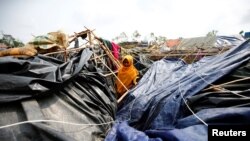UN aid agencies are racing to repair extensive damage from the first heavy monsoon rains in Cox’s Bazar, Bangladesh where many of an estimated one million Rohingya refugees are living in perilous conditions.
UN agencies report heavy continuous rains this week in Cox’s Bazar’s overcrowded, squalid refugee settlements have destroyed nearly 275 shelters and injured 11 people. Preliminary reports indicate the rains have caused at least 26 landslides, putting thousands of people at risk.
UN refugee spokesman, Charlie Yaxley, warns worse is yet to come as the monsoon season has another four months to go. He says trained refugee volunteers have been helping families in urgent need.
“In some cases, this involved rescuing refugees from shelters destroyed by landslides," Yaxley said. "We have temporarily relocated 2,137 people, either because their shelters suffered substantial damage or as a precautionary measure.”
Bangladeshi authorities and aid agencies have made extensive preparations to head off the worst impacts of the monsoon season. These include the building of retaining structures on hillsides, installing drainage, and building roads and bridges.
Yaxley says a network of Emergency Response Teams has been mobilized to identify the needs of the most vulnerable. He says pre-positioned emergency supplies are being distributed to help rebuild, repair and strengthen damaged shelters.
The World Food Program reports multiple landslides have damaged food stocks for thousands of Rohingya refugees. WFP says it has pre-positioned enough food rations in high risk areas around the camps to feed more than 160,000 people. It says distribution will begin Saturday.
The UN agencies report disaster risk reduction work will be ongoing throughout the monsoon season. They are appealing to the international community to support this life-saving effort. They say they are seriously strapped for cash, noting that only one-third of the UN’s $920 million appeal has been received.







